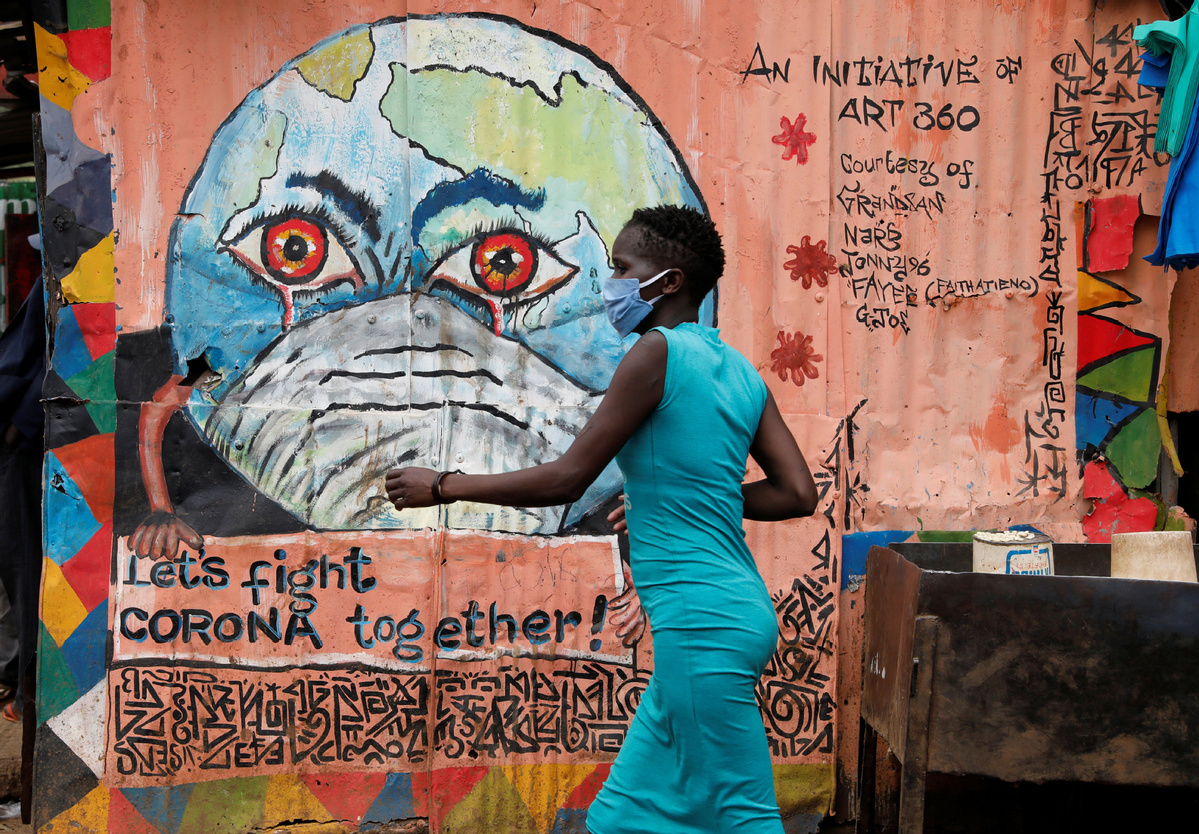
A woman walks past a graffiti promoting the fight against the spread of the coronavirus disease (COVID-19) in the Kibera slums of Nairobi, Kenya, on May 22, 2020. (Photo: Agencies)
African women and girls are looking forward to benefitting from the African Development Bank's newly-approved Gender Strategy for 2021-2025, dubbed "Investing in Africa's women to accelerate inclusive growth." The strategy seeks to strengthen the AfDB's commitment as a leader on the continent to reach gender equality, and women and girls' empowerment in Africa.
Speaking during the strategy's unveiling on Jan 8, Vanessa Moungar, AfDB's bank director for gender, women and civil society, said the initiative is intended to bridge the existing gaps hindering women's contribution to development. She added the bank is intent on addressing obstacles to inclusive economic and social transformation for women across Africa.
"This is a significant milestone for the bank as it will guide our interventions in the next five years as we continue to increase our efforts to achieve outcomes and maximum impact on building gender equality on the ground for women to thrive," Moungar said.
She revealed that the new gender strategy is anchored on the three pillars of empowering women through access to finance and markets, accelerating employability and job creation for women through skills enhancement, and increasing women's access to social services through infrastructure.
On the same day the announcement was made, the board of directors of the AfDB approved a grant of $11.26 million to the government of Chad to finance the Girls' Education and Women's Literacy Project, which is the first bank grant exclusively targeting women and girls.
The project will be financed from the bank's Transition Support Facility and will be implemented over a five-year period by the Chadian Ministry of National Education and Civic Promotion, in coordination with partners involved in the education sector, civil society organizations, and youth organizations. The Chadian government has also committed to give a non-monetary contribution valued at $713,000 towards the program.
"Through this financing, the African Development Bank is providing support to the Chadian government to reduce inequalities through access to education, especially for girls. This enables the development of job skills and the improvement of women's productivity potential through literacy, job training and the development of income-generating activities," Solomane Kone, the bank's deputy director for Central Africa, said.
The Girls' Education and Women's Literacy Project plans to renovate or rebuild school buildings and institutions that educate pre-primary, primary, middle and high school children, and a new women's high school, which would receive educational, scientific and digital equipment. The project has provisions to help supply the schools with safe drinking water, solar power, school clinics and girl-friendly latrines, as well as establish computer and science laboratories.
Commending all parties for their contribution to designing the new strategy, Moungar said that the entire bank ecosystem has been closely involved in its development through a highly consultative process involving bank staff and members of the board, as well as key external stakeholders, namely civil society organizations, regional and international organizations, and government representatives.
"The AfDB has actively led on gender issues since the 1980s, developing and implementing strategies and tools to systematically integrate gender considerations into the bank's operations, as well as targeted initiatives," Moungar said.
"The bank's 2021-2025 vision for gender equality and women and girls' empowerment is to transform the continent's key sectors into grounds of accessible opportunities where women, girls, men and boys, regardless of their background, enjoy equal access and control over productive resources and benefit from supportive infrastructure and services to thrive," she added.
The COVID-19 pandemic has further exacerbated the need for immediate attention to support vulnerable women and girls in fragile areas across the continent. A recent study jointly published by the AfDB and UN Women, based on a survey with over 1,300 women entrepreneurs across 30 African countries, revealed that 80 percent of women-owned small and medium enterprises had to temporarily or permanently shut down due to pandemic restrictions.


